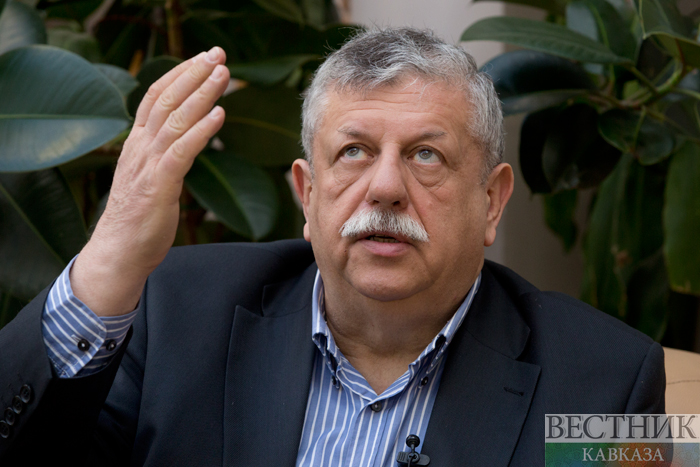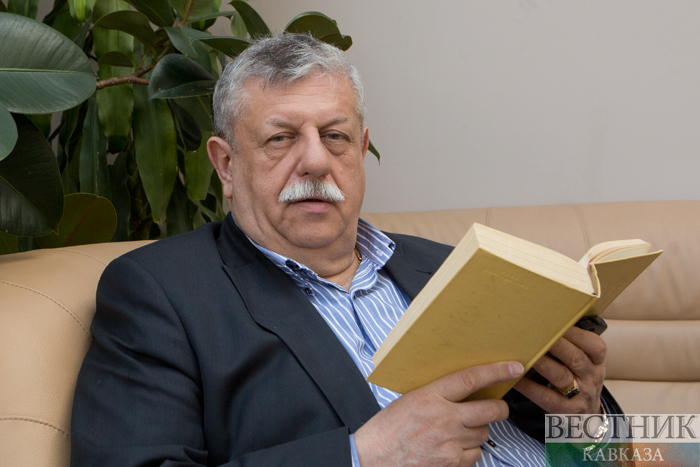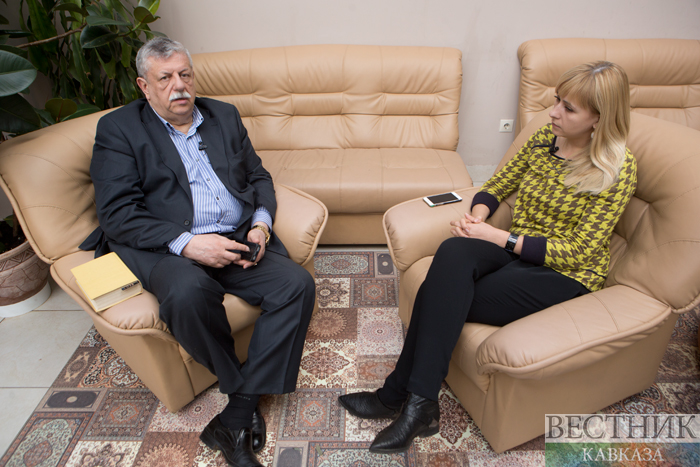Vestnik Kavkaza’s guest is Mikhail Borisov, a theatrical figure, director, actor and longtime host of the Russian Lotto.
- Your activities are so diverse, who are you first of all?
- I am an artist.
- Is there any difference between playing in the theater and on television, in a series?
- Of course. The expressive means are different. In general, cinema and theater are similar for many viewers, but these are completely different arts. And when it is written in a diploma ‘An actor of Theater and Cinema," it's as if in a diploma of an athlete who graduated from a Physical Institute it was written ‘A Player With a Ball’, no matter whether it is a football or a basketball…
- Have you ever been in the Caucasus?
- Of course. When I was a child I was in a camp in Anapa. During my adolescent years, I visited the coast from Sochi to Tuapse. I was in Baku during Soviet times and in 2013 with a delegation of representatives of culture. In general, I often visit the Caucasus, I like it very much. I am the head of the Directing Department at the Boris Shchuckin Theatre Institute and the head of the Variety Department at GITIS. One time I arrived in Kabardino-Balkaria to examine the show of a student of mine from GITIS, Albina Tsarikaeva. They took me to a gorge, where there was a river beneath me, and there were mountains above me. And it is an amazing feeling, when you're standing in between, and there is a trough, but there are mountains as well. This is, in my opinion, Vakhtangov’s sense of the grotesque, when there is a profound justification for all that you do and an acute form of how you do it.

- You mentioned that you were in Baku in 2013. Did you like the city?
- The city impressed me much. I did not expect it. Baku had changed a lot since the Soviet times. It became white, architecturally designed, very slender, thoughtful in terms of architecture. This is a city of high European class. I was struck by the attention that the government and the head of Azerbaijan pay to culture. I was at the Heydar Aliyev Cultural Center, which was designed, this building was brought to life by one of the most famous architects in the world [The Iranian-British architect Zakha Khadid who died on March 31st 2016 – VK]. It's a fantastic feeling of a very beautiful city, a clean city, a white city; a great attention is given to the issues of culture and art.
- How would you assess the level of development of theatrical art in Azerbaijan?
- It is difficult to judge, because I only visited a concert at the Heydar Aliyev Cultural Center. I did not see theater or theatrical plays. I hope I will see them.
- Is there any cooperation at the level of your theater with Azerbaijan?
- The Boris Shchuckin Theatre Institute has been cooperating with Azerbaijan for a long time. In 1997 I staged the play ‘Arshin Mal Alan’ within these walls, and it was a huge success. The Ambassador of Azerbaijan to Moscow attended our play, and the Azerbaijani diaspora in Moscow was delighted, because no one had staged ‘Arshin Mal Alan’ in Moscow for 20-30 years. The students at that time and now stars of theater and cinema, Anton Makarskiy, Masha Paroshina, Oleg Kasin, Mikhail Vladimirov, Natasha Antonova, Cyril Kyaro, played there. They are all stars of theater and television now. We were received in the Azerbaijani Embassy. When I walked in and saw the five-meter long pictures of all 8 characters of ‘Arshin Mal Alan’ produced in full growth, it impressed me much. And then the Vakhtangov Theater was rented to us once a month in order to play this performance, we were taken to Baku once again. And then the Minister of Culture, Polad Bulbuloglu, greeted us, opened the tour. These were the Days of Moscow in Azerbaijan.

- Do students from Azerbaijan study at your university?
- Such work has been done at the level of Ministries of Culture. We are cooperating, and a decision on establishing an Azerbaijani studio has been made. We're going to Baku on July 17th to recruit students and applicants. I hope that the whole of Baku will know that we are taking students to the Vahtanogvskaya School: students and prospective students who will graduate from our institute and return to Azerbaijan and will pour fresh Vakhtangov blood into the Baku theaters, both national and Russian.
- What does it mean to be a student of the Vakhtangov school?
- Talent. Musicality. A body prepared by dance and sport. A spirit fortified with a knowledge of Azerbaijani and Russian literature. A fantasy, internal mobility, talent. We will look at all those who wish to enter. It will be done before our arrival by people who are now engaged in difficult preparatory work. I hope that we will have some serious work in the selection. Our professors, who then will work on the course, are going there. We will look at everyone. We will select 15 of the most talented artists and five directors. We want to educate the directors who will work with them and will go into the theater with them.
- Let’s return to the staging of ‘Arshin Mal Alan’. What attracted you to this work?
- I read the play, I found it unreleased, unread. We had an old film of the 50s with Rashid Behbudov, but it seems to me that it was read as a lyrical story. And it seems to me, first of all, that it is a comedy, not just a drama, but also a comedy. I think it is terribly funny. And we were able to prove it, because people were very happy and laughing when they were watching the show. Maybe, by the way, we will return to a certain stage of learning once again of the classics of Azerbaijani drama.

- What else are you planning to do soon?
- We work so hard and everything is so familiar, so somehow you don't even notice how much you work. I have worked in two schools, worked on television, for more than 20 years I have been continuously on air, played in movies when I am invited, play in television movies when invited, raised my children. I wrote two books. It seems to me that I am doing what is interesting for me and the people with whom I work. We stage performances. I do everything that a person who works in the field of theater should do. You should be multi-functional, because there is so much unexpected, of course, in what you are offered today. I think everything is interesting – at least, it is interesting for me. As soon as it ceases to be interesting I'll finish my work, I'll sit here in this conservatory and watch the sunset.






